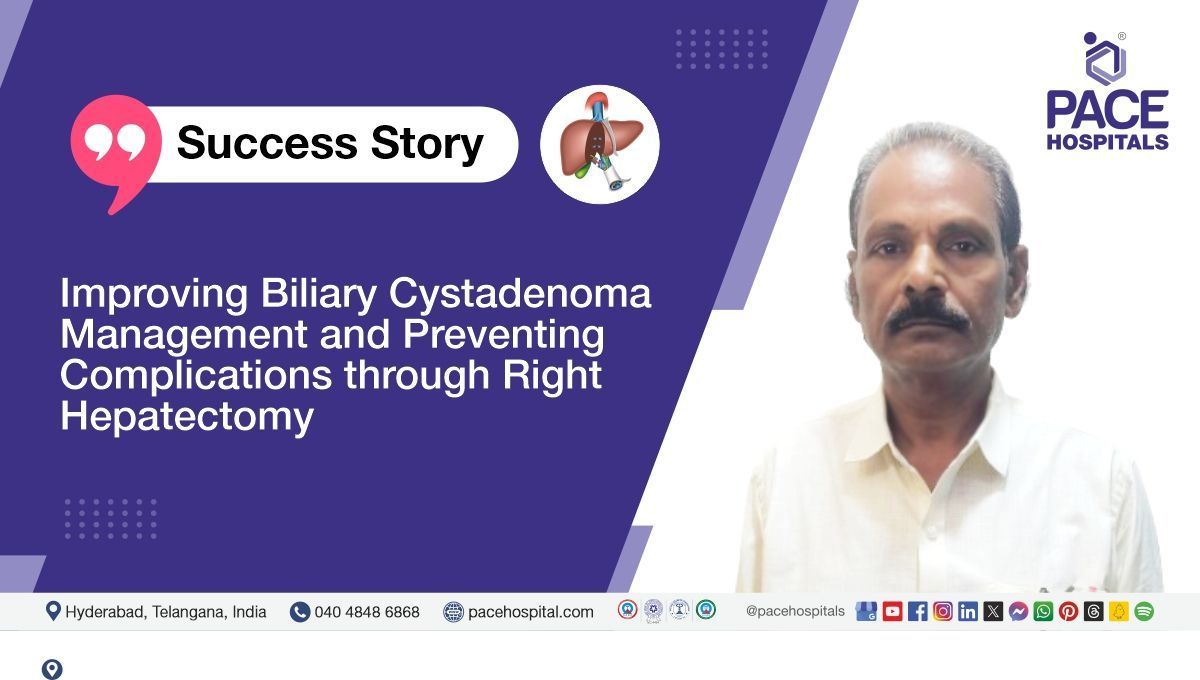Improving Biliary Cystadenoma Management and Preventing Complications through Right Hepatectomy at PACE Hospitals
PACE Hospitals
PACE Hospitals’ Gastroenterology team successfully performed a Right Hepatectomy procedure on a 58-year-old male with Biliary Cystadenoma (BCA) of the right lobe Of The Liver to remove the cystic tumour, preventing complications such as obstruction, infection, or malignant transformation, and to ensure complete excision for potential cure.
Medical History
A 58-year-old male patient approached the gastroenterology department of
PACE Hospitals, Hyderabad, complaining of pain in the right hypochondrium (upper right region of the abdomen, located below the ribcage and above the navel) on and off over the last 6 months.
Diagnosis
Considering the severity of the right hypochondrium pain, he was admitted to PACE Hospitals, Hyderabad, for further treatment and management of his medical condition. He underwent a CECT (Contrast-Enhanced Computed Tomography) abdomen scan, which showed a 7.6x7.6x7.8 CM non-enhancing ill-defined cyst in the right lobe of the liver and was diagnosed with Biliary Cystadenoma of the right lobe of The Liver.
Biliary cystadenoma is a very rare condition in which a benign (non-cancerous) large cyst forms in the liver and has the potential to become malignant. They appear as fluid-filled cysts and may vary in size. While they are not cancerous, these larger growths may cause symptoms or complications that affect liver function. Removing a larger portion of the liver, including the cyst, removes any surrounding abnormal tissue, reducing the risk of recurrence and complications.
Treatment
As the patient was diagnosed with biliary cystadenoma of the right lobe of the liver with severe pain in the right hypochondrium for 6 months, the interventional gastroenterologist, transplant hepatologist, pancreatologist and endosonologist - Dr. Govind Verma, and other team of gastroenterologists, hepatologists, therapeutic endoscopists and liver transplant surgeons affirmed that Right Hepatectomy procedure would help the patient recover from BCA and relieve from associated painful symptoms.
On the day of the procedure, the patient was explained about the disease condition and treatment modality, and his consent was obtained.
After a proper examination by the medical team, the patient underwent a Right Hepatectomy. Findings included: No signs of
ascites (fluid buildup in the abdominal cavity), omentum (a fold of tissue in the abdomen) or Peritoneal deposits (the lining of the abdominal cavity). A fluid-filled lump (cystic mass) was found in specific liver sections (segments 5, 6, and 7). To perform the procedure, surgeons tied off the Right Hepatic Artery (RHA) and Right Portal Vein (RPV) and divided to prevent blood flow to that part of the liver during surgery. The right hepatic vein (RHV) was managed carefully to stop bleeding. A right Hepatectomy was performed without touching the middle hepatic vein (MHV). During the surgery, haemostasis (bleeding) was controlled and stopped. The ends of the cut blood vessels (RPV and RHV) were stitched closed using a special type of thread (5-0 Prolene), and the bile duct (which carries bile from the liver) was stitched with a finer thread (6-0 PDS). The falciform ligament, a fold of tissue that helps support the liver, was secured in place. The omentum was placed over the area where the liver was cut and secured, likely to help protect the area and promote healing.
Post-procedure
During the stay, the patient was treated with IV antibiotics, PPIs, IV fluids, and other supportive medication and care. As the patient had persistent serous drain output, he was discharged in haemodynamically stable condition with advice and discharge medications.
Discharge notes
While he was discharged, the patient was stable and well-tolerant to liquid diet. He was also prescribed proton Pump Inhibitors (PPIs), analgesics, laxatives, and diuretics.
He was advised to consume a high-protein, low-salt diet and also advised to care for the wound and drain it. With a prior appointment, the patient was asked to see Dr. Govind R Verma and Dr. Ravula Phani Krishna, with HPE report, to review the condition in the OPD 5 days. However, he was instructed to admit himself anytime in the medical emergency ward in case of adverse symptoms like fever, abdominal pain, or vomiting.
Importance of Right Hepatectomy in Effectively Treating Liver Cystadenoma
Hepatic cystadenomas are rare tumors that should be considered in the differential diagnosis of various hepatic cystic conditions. Because of its indefinite etiopathology (unclear cause), high recurrence rates, and potential for malignant transformation, complete resection is necessary. The inability to differentiate between cystadenomas, cystadenocarcinomas, or other malignant cystic tumors through preoperative evaluations highlights the need for oncologic resection. A radical excision with wide margins with an anatomic major hepatectomy may be necessary to avoid perforation of tumor and extensive intraoperative bleeding too. Patients who have benign cysts generally do well after surgery, but those with cancerous cysts tend to have poorer outcomes.
Share on
Request an appointment
Fill in the appointment form or call us instantly to book a confirmed appointment with our super specialist at 04048486868
Appointment request - health articles
Recent Articles











